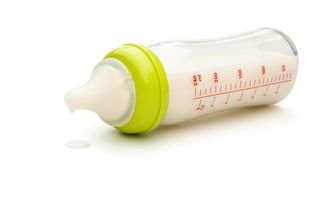Online Breast Milk Carries Health Hazards, Report Warns

Human breast milk is available on the Internet, and people are buying not only raw milk but also products such as breast-milk-flavored ice cream and lollipops, researchers say. But adults who drink breast milk may be putting their health at risk, especially if the milk is unpasteurized, improperly stored or pumped from a woman with a transmittable disease, researchers say in a new report.
Breast milk websites are plastered with health claims stating that breast milk is a natural superfood that can help people build muscles and immunity, according to the authors of the article, led by Sarah Steele, a lecturer at the Global Health and Policy Unit of Queen Mary University of London. Some sites claim it is easily digestible and that it helps erectile dysfunction.
But "such purported benefits do not stand up clinically," the researchers wrote in their article, published today (June 17) in the Journal of the Royal Society of Medicine. "Nutritionally, there is less protein in breast milk than other milks like cow’s milk."
Breast milk is beneficial for infants, and scientists are studying the health effects of its molecular components, but it shouldn't be part of an adult's diet, the researchers said. There are no scientific studies showing that adults who drink breast milk fare any better than those drinking a placebo, they added. [8 Odd Facts About Breasts]
"Breast milk purchased online is not optimal for adult nutrition or in the treatment of disease," the researchers said in their article. In fact, milk bought online comes with more risks than proven benefits, they said.
For instance, unpasteurized breast milk contains hundreds of bacterial species. In a 2013 study, researchers bought breast milk online and found bacteria in 93 percent of the samples. These bacteria may have come from unsterilized equipment and improper storage or shipping practices, those researchers said.
Unpasteurized breast milk could also expose a person who drinks it to a variety of diseases, including cytomegalovirus (a virus related to herpes), hepatitis B and C, HIV and syphilis, the authors of the new report said. People selling milk online may say that the milk donors were tested for these illnesses during pregnancy, but there's no proof these claims are true, and the sellers may not realize that women need to be retested regularly for these conditions to make sure their milk does not have these pathogens.
Sign up for the Live Science daily newsletter now
Get the world’s most fascinating discoveries delivered straight to your inbox.
Moreover, breast milk may contain chemical and environmental contaminants, such as alcohol, drugs, tobacco and caffeine, the researchers said. The milk can also collect toxins if it's improperly stored, for instance, in a container made with Bisphenol A, a chemical linked to health problems that is now banned in baby bottles in the European Union and Canada, the researchers said.
Consumers may get "watered down" breast milk, which may contain cow's milk, water or another milklike substance such as soy. (Sellers often do this to stretch the volume of breast milk, because breast milk has a high market value, the researchers said.)
Adults are generally ineligible to buy breast milk from milk banks set up for infants in need. Some breast milk marketed to adults is sold at four times the amount it costs for infants, the researchers found.
Drinking milk sold on the Internet is "ill advised," the researchers concluded. With the help of health professionals and regulators, the public could be educated about the perils of drinking raw breast milk from an online source, they said.
Follow Laura Geggel on Twitter @LauraGeggel. Follow Live Science @livescience, Facebook & Google+. Original article on Live Science.

Laura is the archaeology and Life's Little Mysteries editor at Live Science. She also reports on general science, including paleontology. Her work has appeared in The New York Times, Scholastic, Popular Science and Spectrum, a site on autism research. She has won multiple awards from the Society of Professional Journalists and the Washington Newspaper Publishers Association for her reporting at a weekly newspaper near Seattle. Laura holds a bachelor's degree in English literature and psychology from Washington University in St. Louis and a master's degree in science writing from NYU.
